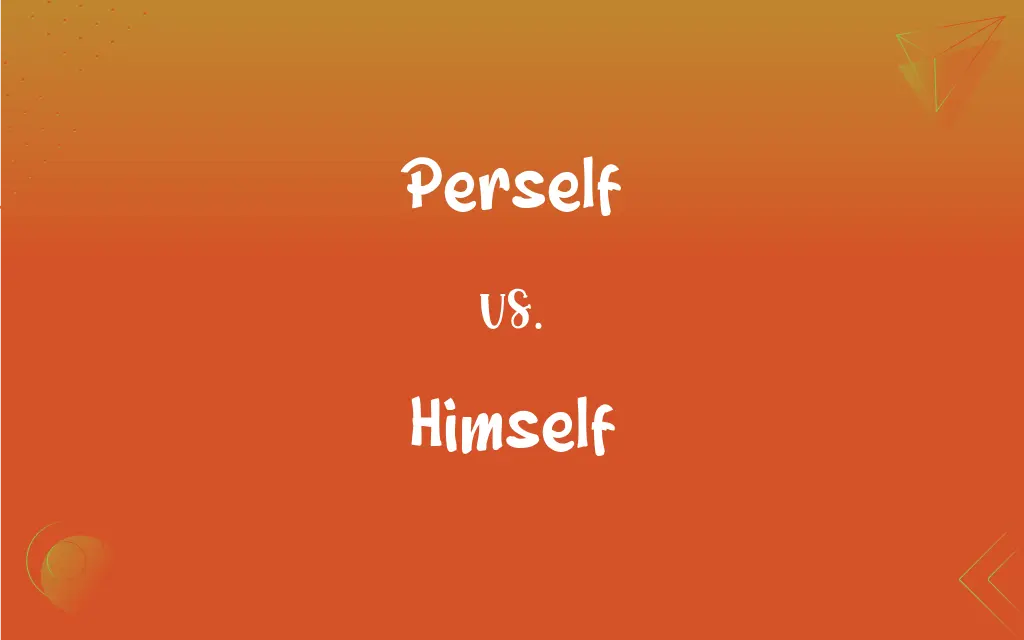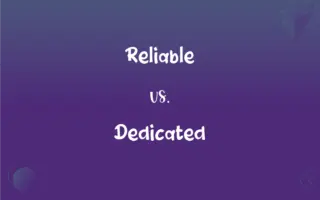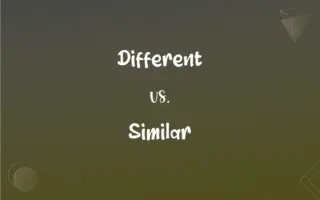Perself vs. Himself: What's the Difference?
By Janet White || Updated on May 24, 2024
Perself is a gender-neutral pronoun used by some non-binary individuals to refer to themselves, while himself is a traditional masculine pronoun used to refer to a male person.

Key Differences
Perself is a gender-neutral pronoun created to provide an inclusive alternative for non-binary individuals. It is used in place of traditional gendered pronouns like himself or herself, reflecting a person's non-binary identity. Himself, in contrast, is a well-established masculine pronoun used to refer to a male individual. It is used to emphasize that the subject is male, often highlighting the subject performing an action on or for himself.
The use of perself is part of a broader movement toward more inclusive language, accommodating the diverse identities within the non-binary community. Himself, however, is part of the traditional binary gender system, specifically indicating male gender.
Perself pronouns, including perself, are newer and less widely recognized compared to traditional pronouns like himself. This means that while himself is universally understood, perself may require explanation and education for broader acceptance and understanding.
Comparison Chart
Definition
Gender-neutral pronoun for non-binary individuals
Masculine pronoun for male individuals
Gender Association
Non-binary, gender-neutral
Male, masculine
ADVERTISEMENT
Usage Context
Used by non-binary individuals
Used by male individuals
Language Inclusivity
Reflects inclusive language for non-binary people
Reflects traditional binary gender system
Recognition
Newer and less widely recognized
Established and universally understood
Perself and Himself Definitions
Perself
Provides a respectful alternative to gendered pronouns.
Morgan always makes time for perself to relax and unwind.
Himself
A masculine pronoun for a male individual.
John built the bookshelf himself, without any help.
ADVERTISEMENT
Perself
Used to emphasize that the action is performed by the non-binary person.
Jamie decided to treat perself to a day off.
Himself
Provides a traditional and widely recognized gendered pronoun.
The CEO introduced himself to the new employees.
Perself
Reflects the identity of someone who does not conform to traditional gender binaries.
Alex expressed perself through art and music.
Himself
Used to emphasize that the action is performed by the male person.
He made himself a cup of coffee.
Perself
Used in place of himself or herself for non-binary individuals.
Casey cooked dinner for perself and enjoyed the quiet evening.
Himself
Reflects the identity of someone who is male.
David prides himself on his punctuality.
Perself
A gender-neutral pronoun for a non-binary individual.
Taylor prepared perself for the meeting, ensuring everything was ready.
Himself
Used in formal and informal contexts to refer to a male individual.
Michael bought himself a new suit for the event.
Perself
Per, themself; gender-neutral object of a verb or preposition that also appears as the subject, the reflexive form of per.
Per injured perself.
Himself
(reflexive pronoun) Him; the male object of a verb or preposition that also appears as the subject
He injured himself.
Himself
(emphatic) He; used as an intensifier, often to emphasize that the referent is the exclusive participant in the predicate
He was injured himself.
Himself
The subject or non-reflexive object of a predicate; he himself.
Himself
(Ireland) The subject or non-reflexive object of a predicate; he used of upper-class gentlemen, or sarcastically, of men who imagine themselves to be more important than others
Has himself come down to breakfast yet?
Have you seen himself yet this morning?
Himself
An emphasized form of the third person masculine pronoun; - used as a subject usually with he; as, he himself will bear the blame; used alone in the predicate, either in the nominative or objective case; as, it is himself who saved himself.
But he himself returned from the quarries.
David hid himself in the field.
The Lord himself shall give you a sign.
Who gave himself for us, that he might . . . purify unto himself a peculiar people.
With shame remembers, while himself was oneOf the same herd, himself the same had done.
It comprehendeth in himself all good.
Himself
One's true or real character; one's natural temper and disposition; the state of being in one's right or sane mind (after unconsciousness, passion, delirium, or abasement); as, the man has come to himself.
Himself
Themselves. See Hemself.
FAQs
What does perself mean?
Perself is a gender-neutral pronoun used by some non-binary individuals to refer to themselves.
What does himself mean?
Himself is a masculine pronoun used to refer to a male individual.
Who uses perself?
Non-binary individuals who prefer gender-neutral pronouns may use perself.
Is perself widely recognized?
Perself is newer and less widely recognized compared to traditional pronouns like himself.
Is himself widely recognized?
Yes, himself is well-established and universally understood in English.
Why use himself?
To refer to a male individual, emphasizing gender in the traditional binary system.
Who uses himself?
Male individuals or those referring to a male person use himself.
Can perself replace himself?
Perself can replace himself for non-binary individuals but not for those who identify as male.
Is himself part of traditional language?
Yes, himself is part of traditional English pronouns reflecting the gender binary.
Is perself part of inclusive language?
Yes, perself is part of efforts to make language more inclusive for all gender identities.
Does himself have a female equivalent?
Yes, the female equivalent of himself is herself.
Why use perself?
To provide a respectful and inclusive pronoun for non-binary individuals.
How do you use perself in a sentence?
Example: Jordan reminded perself to double-check the report before submitting it.
Does perself have a female equivalent?
Perself is gender-neutral and does not have a direct female equivalent; it's used by non-binary individuals.
Is himself used in all English-speaking countries?
Yes, himself is used and understood in all English-speaking countries.
Is perself recognized in formal writing?
Recognition varies, and it may require explanation in formal contexts.
What is the importance of using perself?
Using perself respects and acknowledges non-binary identities, promoting inclusivity in language.
How do you use himself in a sentence?
Example: He congratulated himself on a job well done.
Is himself recognized in formal writing?
Yes, himself is universally recognized and accepted in formal writing.
Is perself used in all English-speaking countries?
Usage of perself varies and is more common in contexts that emphasize inclusive language.
About Author
Written by
Janet WhiteJanet White has been an esteemed writer and blogger for Difference Wiki. Holding a Master's degree in Science and Medical Journalism from the prestigious Boston University, she has consistently demonstrated her expertise and passion for her field. When she's not immersed in her work, Janet relishes her time exercising, delving into a good book, and cherishing moments with friends and family.
































































